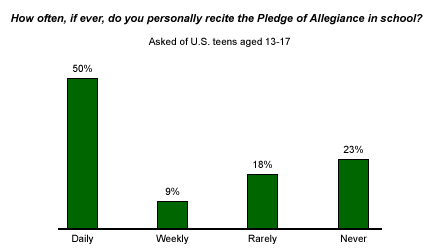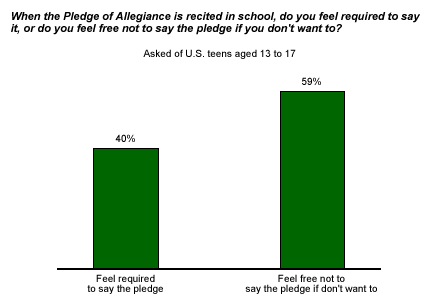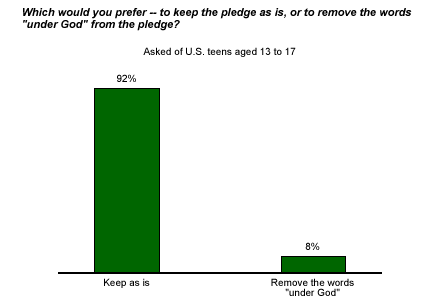American children first began reciting the Pledge of Allegiance in school more than 100 years ago in October 1892, after the words appeared in a family magazine called Youth's Companion. Although the recitation was published anonymously, its authorship is usually attributed to Francis Bellamy, who wrote it to commemorate the 400th anniversary of Christopher Columbus' arrival in the New World. The pledge quickly became one of the most common expressions of American patriotism, especially in America's schools.
Data from the August 2004 ���۴�ýYouth Survey* reflect the ongoing popularity of the pledge in schools -- a majority of U.S. teenagers say that they recite it in school either daily (50%) or weekly (9%). Eighteen percent of teens rarely recite the pledge at school, while fewer than one in four (23%) say they never recite it. Younger teens are slightly more likely than older teens to recite the pledge daily or weekly, suggesting that recitation of the pledge becomes less prevalent in high school than in middle school.

The Case Against the Pledge
At many schools, reciting the Pledge of Allegiance is such a standard part of the morning routine that students may give little thought to it. But the pledge made headlines on June 26, 2002, when the U.S. Ninth Circuit Court of Appeals, in the case of Newdow v. Elk Grove Unified School District, ruled that requiring students to recite the phrase "under God" as part of the Pledge of Allegiance is a violation of the First Amendment. (The "under God" phrase was added to the pledge in 1954.)
The case eventually made its way to the U.S. Supreme Court, where the U.S. Ninth Circuit Court of Appeals' decision was reversed on June 14, 2004. Ironically, the Supreme Court decision occurred on Flag Day, exactly 50 years after the 1954 decision to add "under God" to the pledge.
So the pledge, including the "under God" phrase, is intact for now, and most schools are still permitted to require that their students recite it. Currently, 34 U.S. states have laws requiring schools to include recitation of the pledge during the school day or week, while several other states encourage schools to include it. Although the Supreme Court ruled in 1943 that government schools could not force children to recite the pledge, do most teens feel that they are required to say the pledge when it is recited at school? According to the ���۴�ýYouth Survey, a majority of teens -- 59% -- say that they feel free not to say the pledge if they don't want to. But that leaves a sizable minority of teens who say they do feel required to recite it.

Teen Views on "Under God"
���۴�ýpolling of American adults has consistently shown that Americans support keeping the pledge in its current format, rather than removing the words "under God." Most recently, a March 2004 poll showed that 89% of U.S. adults support keeping the pledge as is, while just 9% would like to remove "under God." When asked the same question, American teenagers express a similarly high level of support for leaving the pledge unchanged: 92% of teens want to keep the current pledge, and 8% would like to see the words "under God" removed.

Among teens, support for keeping the pledge as it is transcends racial, religious, political, and geographic lines. More than 85% of teens in every demographic group support keeping "under God" in the pledge.
*The ���۴�ýYouth Survey is conducted via an Internet methodology provided by Knowledge Networks, using an online research panel that is designed to be representative of the entire U.S. population. The current questionnaire was completed by 439 respondents, aged 13 to 17, Aug. 8-19, 2004. For results based on the total sample, one can say with 95% confidence that the maximum margin of sampling error is ±5 percentage points.
